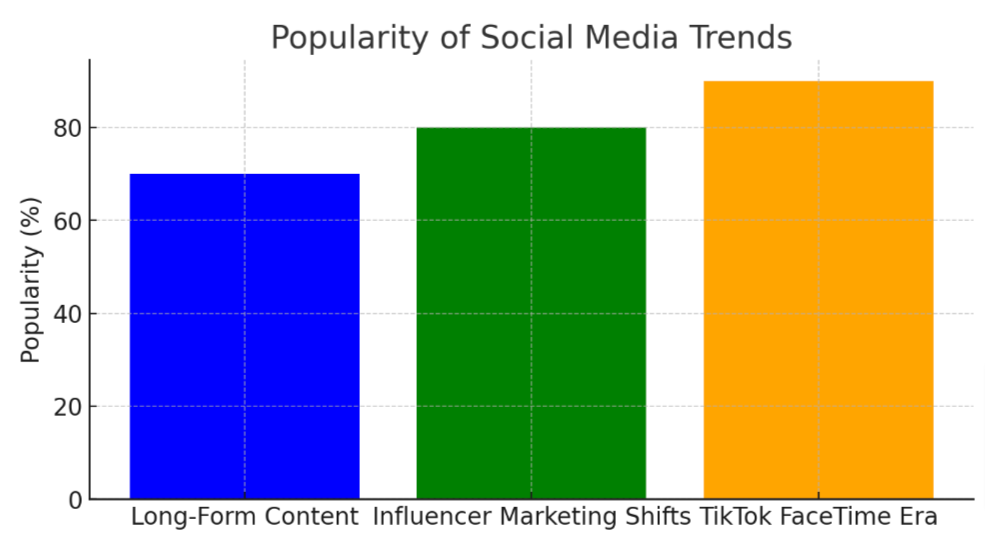Exploring Cutting-Edge Social Media Trends for Review Writers
Are you struggling to keep your social media reviews fresh and engaging? It’s no secret that platforms like TikTok and Instagram are changing the game for content creators. This article is packed with the latest trends and innovations to help review writers stay on top of their social game.
Dive in for tips that can transform your posts!
Key Takeaways
- Review writers are returning to long – form content, mixing it with interactive elements like videos and quizzes to deeply engage with readers.
- Influencer marketing is transforming, focusing more on product placement and authentic use within daily life to subtly promote items.
- TikTok’s “FaceTime” era emphasizes personal interaction in social media, pushing brands toward live engagement with audiences for real-time connection.
- The use of AI in social media is growing, helping tailor content to user preferences and enhancing the efficiency of campaign monitoring.
- Nostalgia plays a significant role in content creation, as brands leverage emotional connections through cultural references from the past.
Social Media Trends for Review Writers
Long-form content is making a comeback, influencer marketing is shifting towards product placements, and TikTok’s “FaceTime” era is on the rise. Additionally, AI is being increasingly incorporated into social media, and there’s a growing incorporation of nostalgia in content.
Long-form content regains popularity
Social media is swinging back to long-form content as users seek more in-depth reviews and stories behind products. This shift represents a desire for substantial, quality posts that resonate on a deeper level with audiences.
Review writers are now crafting extended articles and comprehensive guides that provide significant value beyond quick snapshots of information.
Interactive elements like videos, infographics, and quizzes are being blended into longer texts to keep readers engaged from start to finish. This multidimensional approach caters to those who crave not just facts but also storytelling in their content consumption.
As this trend grows, it’s shaping the way brands strategize their social media marketing efforts by focusing on creating meaningful connections through informative and immersive experiences.
Influencer marketing shifts towards product placement
Influencer marketing is taking a turn, with a stronger focus on product placement. Brands now collaborate directly with social media stars to weave their products into the content naturally.
This strategy creates a seamless viewer experience where sponsored items are part of the story rather than an obvious advertisement. Instead of just talking about products, influencers use them during their regular posts or videos, giving followers a realistic look at how they’re used in daily life.
This trend marks a shift from traditional ads to more subtle and authentic promotions within influencer content. As review writers spotlight this change, they highlight how cleverly positioned products can drive consumer interest without disrupting the entertainment value of the content.
It’s all about striking that perfect balance between showing off a product and keeping it genuine for the audience—this approach turns viewers into potential buyers by fostering trust in both the influencer and what they endorse.
Rise of TikTok’s \”FaceTime\” era
TikTok’s “FaceTime” era signals a new chapter in social media engagement, where personal interaction takes center stage. Users are flocking to TikTok not just for entertainment but for face-to-face conversations with content creators and fellow users alike.
This trend echoes the growing demand for authenticity and direct connection in digital spaces, making virtual hangouts the norm rather than an exception. With this movement, videos become more interactive; expectations shift towards real-time responses rather than pre-recorded messages.
Creators now craft intimate experiences that resemble hanging out with friends, blurring the lines between public content and private chats. As TikTok paves the way for these changes, social media marketing strategies also evolve to incorporate live interactions into their campaigns.
Brands that adapt to this trend are likely to see increased user engagement and stronger connections with their audience.
Moving forward from TikTok’s influence on communication styles, let’s explore how AI is revolutionizing social media platforms further.
Increasing use of AI in social media
Amid the rise of TikTok’s “FaceTime” era, social media is experiencing an increasing use of AI. Platforms are integrating artificial intelligence to enhance user engagement by providing authentic and personalized content.
AI features are reshaping the influencer market, enabling brands to target specific audiences effectively. Additionally, there has been a shift toward bite-sized content due to shorter attention spans, as AI algorithms analyze user behavior and preferences.
The incorporation of AI in social media has significantly impacted social commerce on platforms like Facebook and Instagram, facilitating targeted advertising and boosting sales through personalized product recommendations.
Incorporation of nostalgia in content
Nostalgia has become a powerful tool in content creation, captivating audiences and evoking emotions. Brands are integrating nostalgic elements into their social media content to establish deeper connections with consumers.
By tapping into shared cultural memories, companies can create relatable and engaging posts that resonate with their target audience. Incorporating familiar references from the past, whether it’s through throwback photos, vintage-inspired designs, or classic slogans, helps to humanize brands and foster a sense of community among followers.
Utilizing nostalgia in content is an effective way for review writers to enhance storytelling and build authenticity within their reviews. By infusing personal anecdotes or referencing iconic moments from the past related to the product or service being reviewed, writers can evoke emotional responses and connect with readers on a more profound level.
The Role of Social Media in Customer Support
Social media plays a crucial role in providing efficient support to impatient customers, with its continuously growing use and dominance in advertising.
Providing efficient support to impatient customers
Efficient support for impatient customers is crucial in today’s fast-paced digital landscape. Brands must use social media as a platform to swiftly address customer concerns and provide real-time assistance.
This approach includes prompt responses, personalized interactions, and proactive problem-solving to ensure customer satisfaction. Utilizing AI-powered chatbots can help streamline the process, offering instant solutions while freeing up human resources to focus on more complex issues.
Engaging with impatient customers on social media requires a proactive and empathetic approach. Companies should leverage user-generated content such as testimonials and reviews to build trust and credibility among their audience.
Continuously growing use of social media
Social media’s use continues to surge as platforms evolve and expand. Businesses increasingly leverage social channels for advertising, customer support, and engaging with their audience.
Brands are adapting to the rapidly shifting landscape, recognizing the necessity of an active social media presence to maintain relevance in the digital market.
User-generated content on social media serves as a valuable tool for businesses seeking brand exposure. With a growing emphasis on authentic and personalized interactions, companies strive to create engaging content that resonates with consumers’ emotions and values.
Dominance of social media in advertising
As social media continues to grow in popularity, its dominance in advertising becomes increasingly evident. Marketers are leveraging the platform-specific changes and user-generated content to reach their target audience more effectively.
Brands are actively utilizing social media algorithms, analytics, and user engagement strategies to create impactful digital advertising campaigns that resonate with their audience.
Social media has become a pivotal channel for advertising due to its ability to foster direct interaction with consumers. By harnessing the power of social commerce and influencer marketing, brands can seamlessly integrate products into engaging content, helping them connect with potential customers on a deeper level.
Integration of AI in Social Platforms
Social platforms are shifting towards more authentic and personalized content through the use of AI, impacting influencer marketing and user engagement. Additionally, there’s a noticeable shift to bite-sized content due to shorter attention spans on social media.
Enhanced user engagement through authentic content
Social media platforms are increasingly favoring authentic content to drive user engagement. By incorporating genuine and relatable material, brands can establish deeper connections with their audience.
This approach fosters trust and loyalty, encouraging active participation and interaction with the content.
This shift towards authenticity is revolutionizing the way businesses communicate with their customers. It encourages a more humanized approach, enabling brands to form meaningful relationships with their audience, ultimately leading to higher levels of engagement.
The adaptation of authentic content stands as a testament to the evolving landscape of social media marketing. As companies continue to prioritize genuine interactions over traditional advertising tactics, they are witnessing an increase in user engagement across various platforms.
Changes in the influencer market
Influencer marketing is evolving as brands shift towards product placement, seeking more authentic and integrated content. The influencer market is adapting to shorter attention spans by moving towards bite-sized content, maximizing engagement with audiences.
Furthermore, Facebook and Instagram’s influence on social commerce is growing, emphasizing the importance of a platform-specific approach to influencer marketing strategies.
The influencer market undergoes constant change due to shifts in consumer behavior. Brands are increasingly focused on creating authentic partnerships that resonate with their audience while also leveraging the power of social media algorithms for maximum reach and impact.
Shift to bite-sized content due to shorter attention spans
Social media platforms are witnessing a shift towards bite-sized content, catering to the demand for quick and easy-to-consume information. Brands and review writers are embracing this trend, creating short and impactful videos, infographics, quizzes, and interactive content to engage their audience effectively.
This transition aligns with the need to capture attention in an increasingly fast-paced digital environment.
As social media continues to evolve rapidly, innovations in content creation are essential for review writers to adapt to changing consumer behavior and preferences. The emphasis on succinct and visually appealing material caters specifically to today’s shorter attention spans while presenting new opportunities for engaging audiences through diverse multimedia formats.
Impact of Facebook and Instagram on social commerce
Facebook and Instagram play a pivotal role in driving social commerce, enabling businesses to directly sell products through their platforms. With the integration of shopping features, users can seamlessly discover and purchase items without leaving the app.
Brands leverage targeted advertising on these platforms to reach potential customers based on their interests and interactions, significantly influencing purchasing decisions. The visual nature of Instagram also allows for engaging product showcases that resonate with users, fostering a sense of community around specific brands or products.
Businesses harness Facebook’s robust analytics to gain insights into consumer behavior and tailor their marketing strategies accordingly. Additionally, user-generated content serves as a powerful tool for authentic brand promotion, stimulating trust among potential buyers.
Future Predictions and Challenges
The future of social media for review writers includes the continued growth of TikTok, expansion of social commerce, mainstream adoption of augmented reality, the rise of the creator economy, and the influence of AI on content creation and campaign monitoring.
These trends will shape the way review writers engage with their audience and create impactful content in the coming years.
Continued growth of TikTok
TikTok continues to experience exponential growth, cementing its status as a dominant force in the social media landscape. Brands are increasingly recognizing TikTok’s potential for reaching younger audiences and are investing in influencer marketing on the platform.
With its user-friendly interface and emphasis on short-form video content, TikTok is shaping new trends in digital advertising and content creation. As businesses seek to expand their online presence, integrating TikTok into their marketing strategies has become essential for staying relevant and engaging with a diverse audience.
Moving forward from the continued growth of TikTok, let’s delve into the expanding realm of social commerce and its impact on consumer behavior.
Expansion of social commerce
Social commerce is rapidly expanding as more brands and businesses embrace the direct selling potential of social media platforms. With the integration of shopping features on various apps like Instagram, Facebook, and TikTok, consumers now have a seamless purchasing experience within their favorite social networks.
This trend also gives rise to influencer marketing’s impact on purchase decisions, with influencers showcasing products directly through engaging content, driving sales and brand awareness.
As user-generated content gains prominence in social commerce strategies, companies are leveraging customer reviews and testimonials to build trust and credibility with potential buyers.
Mainstream adoption of augmented reality
Augmented reality (AR) is gaining widespread acceptance, with brands integrating AR features into their social media strategies to enhance user engagement. Social platforms are implementing AR filters and effects to drive interactive experiences for their audiences, contributing to increased user-generated content.
This innovative approach enables brands to create immersive and personalized interactions with consumers, amplifying brand awareness and customer loyalty. As a result, social media marketers are tapping into the potential of AR to elevate user experiences on digital platforms, paving the way for a more dynamic and captivating social media landscape.
The incorporation of augmented reality in social media introduces new opportunities for businesses to showcase products/services creatively and increase the effectiveness of influencer marketing campaigns.
The rise of the creator economy
With the mainstream adoption of augmented reality paving the way for innovative content creation, there’s a notable surge in the creator economy. Content creators are leveraging various social media platforms to produce original and engaging content while building their personal brands.
This trend is reshaping traditional marketing strategies as businesses turn to these creators for authentic and relatable promotional material that resonates with their target audience.
As this creator-based economy continues to gain momentum, it presents new opportunities and challenges for both content writers and brands looking to capitalize on this digital landscape.
The creator economy is transforming the way online reviews, digital advertising, user-generated content, and brand management intersect within social media platforms. Collaborations between businesses and influential content creators have become an effective strategy in tapping into niche audiences through genuine recommendations and endorsements.
Influence of AI on content creation and campaign monitoring
As we look to the future, it’s clear that AI is becoming increasingly influential in content creation and campaign monitoring. Social media platforms are leveraging AI features to streamline the content creation process and enhance campaign effectiveness.
With the help of AI, marketers can analyze data to understand audience preferences and behavior, create personalized content at scale, optimize ad targeting, and measure campaign performance more accurately.
AI offers valuable insights into user-generated content across various social media platforms. It enables review writers to generate engaging videos, infographics, quizzes, and other interactive content with a multidimensional approach that resonates with their target audiences.

Conclusion
Innovations and trends in social media are shaping the landscape for review writers. Incorporating long-form content, embracing nostalgia core, and leveraging AI features offer exciting opportunities for fresh and engaging content creation.
Review writers should adapt to the evolving influencer market, harness the potential of social commerce, and prepare for the mainstream adoption of augmented reality to stay ahead in this dynamic environment.
Embracing these changes will enable review writers to thrive amidst the ever-evolving social media landscape.

